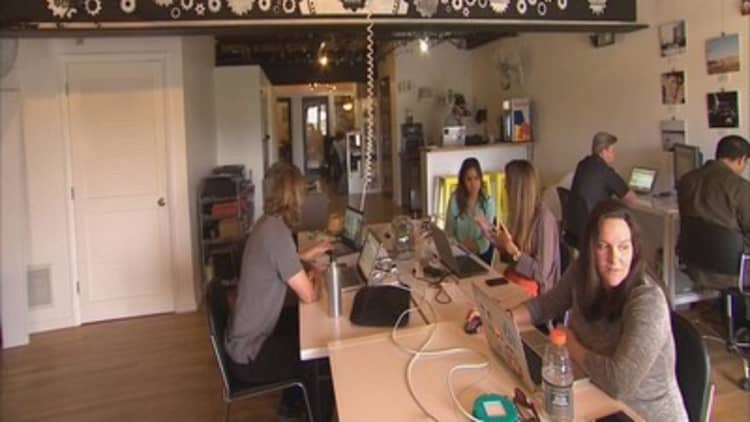
More Americans are becoming their own boss. More than 53 million Americans are now doing freelance work, making up 34 percent of the U.S. workforce, according to a 2014 survey by research firm Edelman Berland, commissioned by the Freelancers Union. Those numbers are only expected to grow.
Yet to remove the distractions of home and cafes—spaces where many self-employed workers are known to congregate—some freelancers and entrepreneurs are turning to sharing office space, known as "co-working."
"Co-working is in its essence, a shared, collaborating workspace. We provide desk access and a community for entrepreneurs, small businesses, start-ups, mostly technology focused," said Bret Morgan, co-founder of Cowerks, a shared office space in Asbury Park, New Jersey.
Read MoreWhat freelancers should know
There are now more than 2,500 co-working spaces around the globe, with more opening weekly, according to co-working magazine Deskmag.
Co-working goes mainstream
Even Fortune 100 companies are getting into the action. Verizon is forging a joint venture with co-working space Grind to build such spaces across the country, according to Grind's co-founder, Benjamin Dyett.
"One of the most amazing things in our industry is the fact that it's mainstreaming so quickly," Dyett said.
State governments are also getting involved, giving grants for co-working spaces to expand to help budding tech scenes. Both Asbury Park's Cowerks and Mission 50 in Hoboken, received grants from New Jersey to expand.
Read MorePlan to freelance in the future? What you should know
"Over a 10-year period, we've seen mobile technology shifting the demands of office space," said Gregory Dell'Aquila president of Mission 50.
For freelancers, co-working gives them access to desk space, conference rooms and human interactions at low-cost prices. Rates to drop in for the day start at $15, and monthly shared desk space runs $250 to $600. Some co-working spaces offer private offices or spaces for teams to work.
In addition, most co-working spaces have no security deposits or leases.
"The real thing that makes us different from just going out and renting your own office is the ability to scale up and scale down as your needs change without getting into a five- or 10-year lease, when you might not know where your start-up is going to be in three months," said Danny Croak, co-founder of Cowerks.
More than just sharing desks
Proponents say co-working is about more than cheap rent.
"If I looked at this business as a real estate-only business, I'd probably be out of business," Dyett told CNBC. "What keeps people at Grind is that they can come in in the morning and be inspired by the people working hard and succeeding next to them."
Co-working members often collaborate on projects and sometimes go on to found companies together, according to Croak.
With the number of freelancers expected to reach 65 million by 2020, co-working may be considered something of a growth industry. More than 100,000 co-working members are expected by 2018, according to Emergent Research.
"All your office buildings, if they haven't shifted already, will be shifting," said Mission 50's Dell'Aquil. "Co-working will be a presence in how we work."
"On the Money" airs on CNBC Sundays at 7:30 p.m. ET, or check listings for airtimes in local markets.



